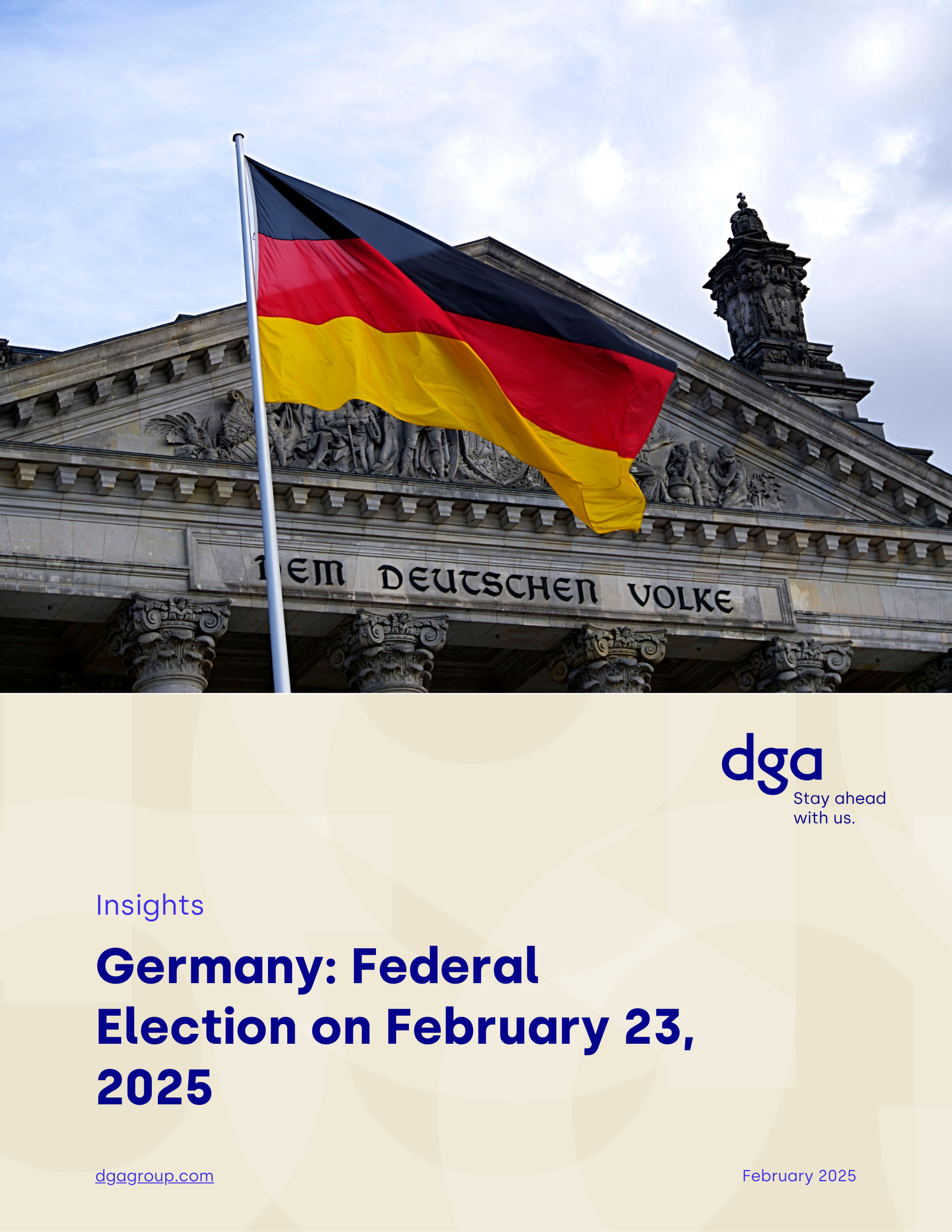Germany: Federal Election on February 23, 2025

Government in transition without parliamentary majority
The early months of 2025 are focused on the German federal election set for February 23, a pivotal event that will shape the country’s political future. Following the collapse of the governing coalition of the center-left SPD, the Greens, and FDP/Liberals on November 6, 2024, the remaining two-party government of SPD and Greens is now in a transitional period, lacking a majority in the Bundestag to pass laws and initiatives. During this period, the Federal Government will remain in office until a new administration is formed.
Economic hardship
Germany is finding itself in turbulent waters. Since 2023, its economy has stagnated and the outlook for the coming years is equally concerning. The export-driven economy is struggling with high energy and labor costs, with several key industries announcing tens of thousands of job cuts. The automotive sector, in particular, is feeling mounting pressure from Chinese competitors. Consequently, revitalizing the national economy has become the central election topic, sparking widespread debates on how to rebolster the German economy. Billions of euros in investments are expected to flow into infrastructure and industrial transformation. The coming years will be a turning point, determining whether Germany can sustain its leading role, both in the European and global context.
Migration policy dominates federal election campaign
The political debate has intensified following the tragic terror attack in Aschaffenburg, a city in the German state of Bavaria, in which a young child and an adult were killed—with several other children injured —by an asylum seeker obliged to leave the country. The emotional intensity of the issue has been further amplified discussions amid the ongoing election campaign. Until now, migration policy had been one of several key issues, primarily pushed by the far-right AfD party. However, in the wake of the Aschaffenburg attack, Friedrich Merz, the CDU/CSU candidate who is widely expected to become the next chancellor, has made the migration a central pillar of his campaign, outlining strict measures he intends to implement.
Conservatives leading in polls
In the latest poll, the CDU/CSU, Germany’s conservative Christian-democratic parties, previously led by former Chancellor Angela Merkel (CDU), is in the lead with 30%. The SPD, the social-democratic party of current Chancellor Olaf Scholz, trails at 16%, while the AfD, the far-right, populist, and Eurosceptic party, holds 21%. The Greens stand at 13%, while the liberal FDP, which left the governing coalition in November, is polling at 4%. It remains uncertain whether the FDP will surpass the 5% threshold required to secure Bundestag seats.
Based on these opinion polls, it is highly likely that the next federal government will be led by the CDU/CSU, with Friedrich Merz (CDU) as Chancellor. However, the party will need at least one coalition partner to achieve a stable majority. This will either be the Social Democrats or the Greens, with the FDP potentially joining as a third coalition partner if they enter parliament. Despite the far-right AfD’s strong polling performance, no other partyis willing to form a coalition with them due to their populist and anti-constitutional stance.
A third of voters are still undecided
Current polls only reflect the preferences of those who have already made up their minds. It is striking that the number of undecided voters continues to rise, with almost one third of eligible voters in Germany remaining undecided. This level of indecision is atypical so close to the election and can still lead to substantial changes to the outcome.
The candidates for chancellor
The far-right AfD has also nominated a candidate for chancellor, however, the following overview will focus solely on the parties that are likely to play a part in forming the next federal government.
Election manifestos
As Germany approaches its federal election, the major political parties —the CDU/CSU, the SPD, and the Greens —have unveiled their draft and final election programs. While these manifestos cover a wide range of topics, this overview focuses specifically on key points related to digital policies, economic strategies, and sustainability, highlighting CDU/CSU, SPD and the Green parties’ strategies to address Germany’s pressing challenges in these areas.
Business relevance: The content of the party election manifestos will form the basis for the coalition negotiations and the associated coalition agreement.
Next steps: The coalition agreement will be negotiated between the parties which will form the next federal government following the election. The agreement sets out the next government’s goals for the entire legislative period.
CDU/CSU election program
Digital policy
The CDU/CSU aims to strengthen digital policy by establishing an independent Federal Ministry for Digital Affairs, as digital topics were previously handled mainly by the Ministry of Transport with several other federal ministries in charge. The goal is to consolidate responsibilities for infrastructure, data policy, artificial intelligence, platforms, digital services, and administrative digitization.
The CDU/CSU prioritize data sovereignty over data minimization, ensuring individuals have control over when and how their personal data is used, while data collectors and processors must adhere to strict diligence standards. Additionally, the CDU/CSU seek to leverage the potential of open data for innovation and economic growth, emphasizing that broad data availability is essential for advancements in artificial intelligence.
Reducing bureaucracy at national and EU level
The CDU/CSU aim to reduce documentation and reporting obligations and will advocate for this at the EU level as well. They want to introduce an “EU forechecking” mechanism to engage earlier, more strategically, and more effectively in European legislative processes in Brussels. With an “Anti-Gold-Plating Law,” they intend to roll back national regulations that go beyond European law.
Sustainability and the supply chain
The CDU/CSU are committed to achieving climate neutrality by 2045 in line with the Paris Climate Goals but emphasize the importance of balancing sustainability with a strong economy. Climate protection should not lead to deindustrialization. To reduce resource consumption, they advocate for a responsible circular economy. Additionally, they aim to eliminate legal barriers to encourage innovative product design and a diverse mix of technologies. Regarding supply chains, EU taxonomy, and corporate sustainability reporting, the CDU/CSU plan to repeal the national Supply Chain Act, aligning solely with EU regulations without imposing additional national requirements. At the European level, they seek to prevent excessive economic burdens from regulations on sustainable investments and corporate sustainability reporting.
SPD election program
Digital policy
The SPD advocates for adapting the federal government’s innovation policy to new technological developments such as artificial intelligence (AI) and quantum technology. A key priority for the party is the further development of the AI strategy.
Trade policy with China
The SPD supports the implementation of Germany’s first China strategy and advocates for a coordinated European approach towards China defined as a partner, competitor, and systemic rival.
Sustainability and the supply chain
The SPD aims to maintain Germany’s industrial competitiveness while advancing climate-friendly production. To achieve this, it advocates for a simplified Carbon Border Adjustment Mechanism (CBAM) complemented by export promotion and emphasizes the need for affordable energy. The SPD proposes capping transmission grid fees and extending reduced fees to more energy-intensive industries. Additionally, it supports the EU Clean Industrial Deal and calls for a pragmatic implementation of the National Circular Economy Strategy (NKWS). The party also backs the EU Supply Chain Directive to ensure clear regulations and equal conditions for businesses across Europe.
Green’s draft election program
Digital policy
The Greens aim to facilitate the digitalization of the economy and the development of digital business models. They plan to promote the application of artificial intelligence (AI), establish robust cybersecurity standards, and strengthen digital skills in businesses. Additionally, they seek to reduce data protection bureaucracy.
Trade policy with China
The Greens believe that unfair trade practices and market distortions require decisive action. Therefore, they advocate for the imposition of countervailing tariffs, such as on steel, where necessary, and support the European Commission in its negotiations with China regarding the dumping of electric vehicles, aiming to protect the interests of European industry. They also emphasize the need to close loopholes in customs law, through which particularly Asian online retailers like Temu bypass customs and undermine European manufacturers by flooding the market with unsafe, disposable products.
Sustainability and the supply chain
The Greens emphasize the need for a climate-neutral economy, advocating for substantial investments in renewable energy and sustainable technologies. They strongly support circular economy principles to enhance resource security and reduce waste, particularly in the implementation of the national circular economy strategy (NKWS). Their industrial policy focuses on providing financial incentives for companies that adopt climate-friendly practices and technologies. Regarding supply chains and ESG criteria, the Greens stress the importance of transparency and adherence to environmental, social, and governance standards. They also prioritize sustainable finance initiatives to facilitate investments in green technologies and encourage responsible business practices. Furthermore, the Greens support the expansion and implementation of the European Green Deal, viewing it as a framework for fair competition and a path to market leadership in sustainable technologies.
About us
DGA Group is a global advisory firm that helps clients protect – and grow – what they have built in today’s complex business environment. We understand the challenges and opportunities of an increasingly regulated and interconnected world. Leveraging the experience and expertise of our deep bench of public affairs, government relations, communications, and business intelligence consultants, we help clients navigate and shape global policy, reputational and financial issues. To learn more, visit dgagroup.com.
Please contact Heiko Weiss, Partner and Managing Director of the German practice in Berlin, at heiko.weiss@dgagroup.com with any questions or arrange a follow up conversation.


